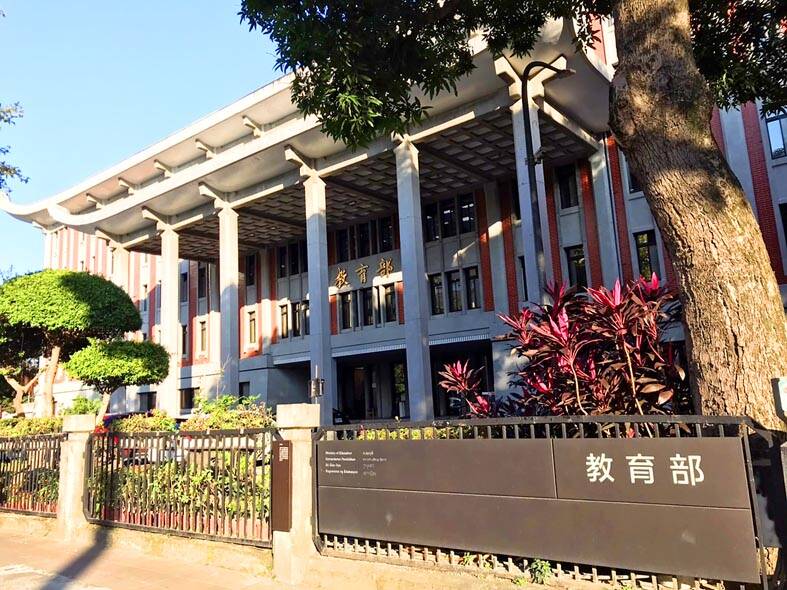A total of 112 Taiwanese university and college programs reported that they enrolled no new students this academic year, the Ministry of Education said yesterday amid concern over the nation’s aging population.
The ministry published the latest college enrollment statistics on its public information platform of higher learning institutions at https://udb.moe.edu.tw/udata.
National Taiwan University’s theater, geography, oceanography, plant pathology and microbiology graduate programs were among the 35 doctoral and master’s degree programs that did not enroll any students this year, the data showed.

Photo: Yang Mien-chieh, Taipei Times
National Tsinghua University’s quantum technology and advanced materials, electronic and photonic engineering programs, and National Central University’s economics, human resource management, applied geology and material sciences programs were also bereft of new students, it said.
Seventeen master’s programs did not enroll students, including eight regular programs and five night-school programs, the ministry said.
The remaining programs without new students were predominantly bachelor’s programs or their equivalent offered at private universities or college-level vocational institutions, it said.
A National Taiwan University spokesperson said that its theater and microbiology graduate programs had seven and three applicants respectively whose test scores did not meet standards.
No doctoral-seeking applicants expressed interest in geology, oceanography, plant pathology or microbiology, the spokesperson said.
A National Central University spokesperson said the doctoral programs with zero enrollments were seeking one to three students and most of them received one application each.
These applicants were either rejected for failing to meet test score standards or ended up attending the master’s degree version of the program due to the latter’s perceived advantage in job opportunities, they said.
The university is to discuss the design of its doctoral programs to boost competitiveness, the spokesperson said.
According to ministry data, 19 institutions of higher learning reported having enrolled less than 60 percent of their capacity for new students, with all but one being private institutions, ministry data showed.
Kao Yuan University, which is based in Kaohsiung and filled 15.7 percent of available spots, had the lowest enrollment rate in the nation, while National Taitung Junior College was the sole public institution with an enrollment rate of less than 60 percent.

MORE VISITORS: The Tourism Administration said that it is seeing positive prospects in its efforts to expand the tourism market in North America and Europe Taiwan has been ranked as the cheapest place in the world to travel to this year, based on a list recommended by NerdWallet. The San Francisco-based personal finance company said that Taiwan topped the list of 16 nations it chose for budget travelers because US tourists do not need visas and travelers can easily have a good meal for less than US$10. A bus ride in Taipei costs just under US$0.50, while subway rides start at US$0.60, the firm said, adding that public transportation in Taiwan is easy to navigate. The firm also called Taiwan a “food lover’s paradise,” citing inexpensive breakfast stalls

TRADE: A mandatory declaration of origin for manufactured goods bound for the US is to take effect on May 7 to block China from exploiting Taiwan’s trade channels All products manufactured in Taiwan and exported to the US must include a signed declaration of origin starting on May 7, the Bureau of Foreign Trade announced yesterday. US President Donald Trump on April 2 imposed a 32 percent tariff on imports from Taiwan, but one week later announced a 90-day pause on its implementation. However, a universal 10 percent tariff was immediately applied to most imports from around the world. On April 12, the Trump administration further exempted computers, smartphones and semiconductors from the new tariffs. In response, President William Lai’s (賴清德) administration has introduced a series of countermeasures to support affected

CROSS-STRAIT: The vast majority of Taiwanese support maintaining the ‘status quo,’ while concern is rising about Beijing’s influence operations More than eight out of 10 Taiwanese reject Beijing’s “one country, two systems” framework for cross-strait relations, according to a survey released by the Mainland Affairs Council (MAC) on Thursday. The MAC’s latest quarterly survey found that 84.4 percent of respondents opposed Beijing’s “one country, two systems” formula for handling cross-strait relations — a figure consistent with past polling. Over the past three years, opposition to the framework has remained high, ranging from a low of 83.6 percent in April 2023 to a peak of 89.6 percent in April last year. In the most recent poll, 82.5 percent also rejected China’s

PLUGGING HOLES: The amendments would bring the legislation in line with systems found in other countries such as Japan and the US, Legislator Chen Kuan-ting said Democratic Progressive Party (DPP) Legislator Chen Kuan-ting (陳冠廷) has proposed amending national security legislation amid a spate of espionage cases. Potential gaps in security vetting procedures for personnel with access to sensitive information prompted him to propose the amendments, which would introduce changes to Article 14 of the Classified National Security Information Protection Act (國家機密保護法), Chen said yesterday. The proposal, which aims to enhance interagency vetting procedures and reduce the risk of classified information leaks, would establish a comprehensive security clearance system in Taiwan, he said. The amendment would require character and loyalty checks for civil servants and intelligence personnel prior to